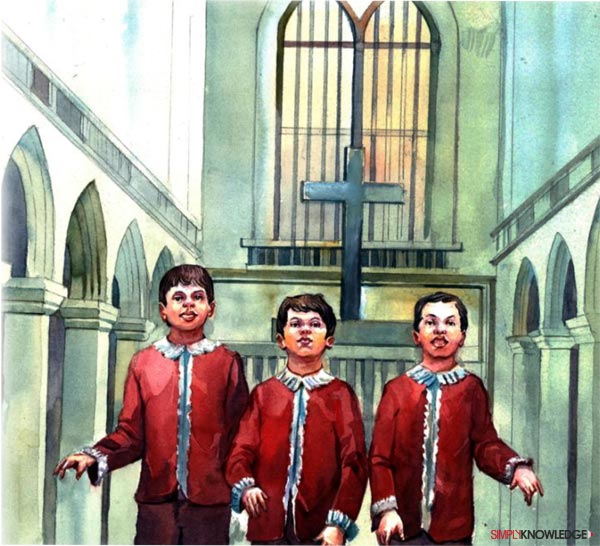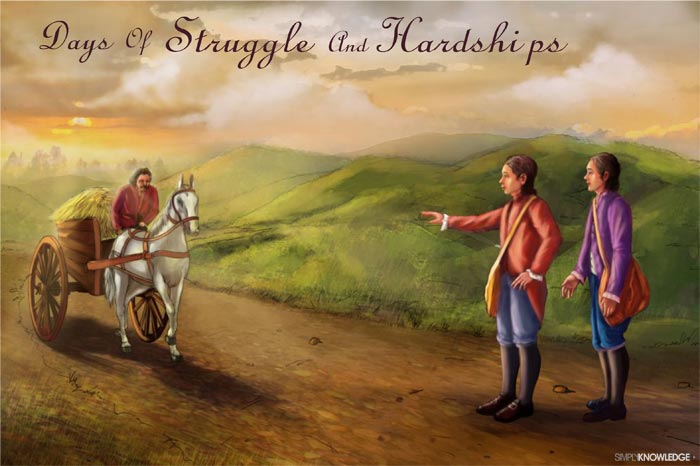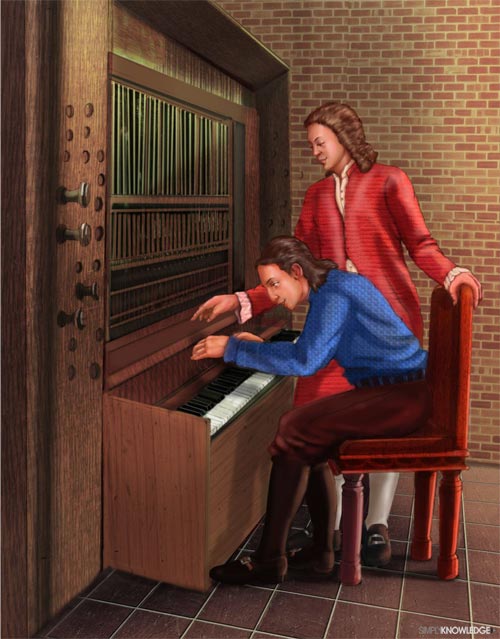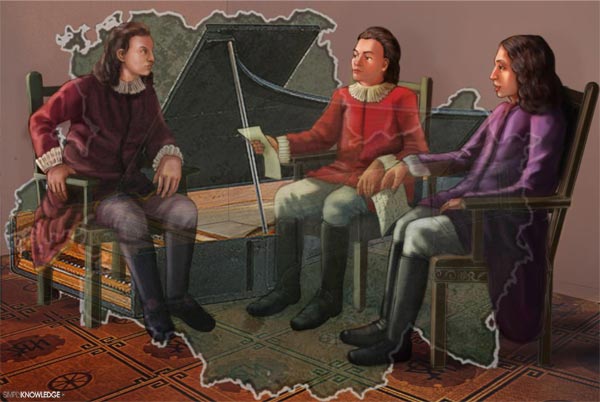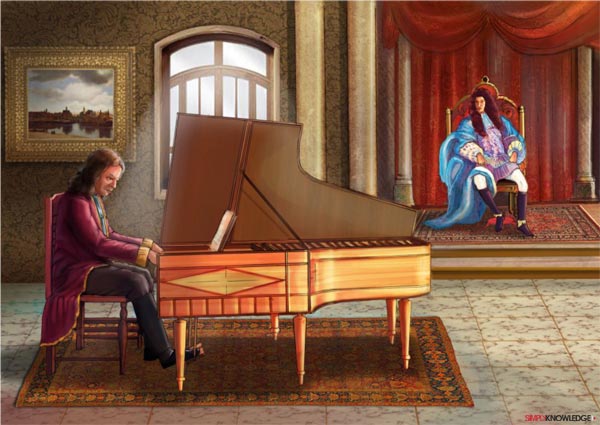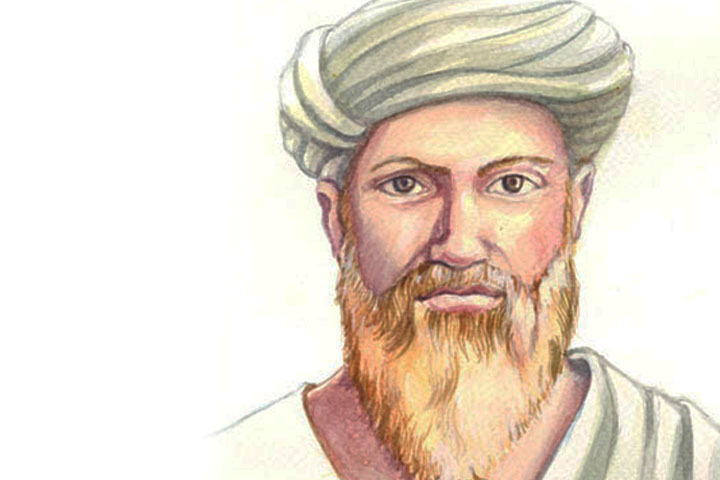
Introduction
“Music is a Moral law.”
“Music gives soul to the Universe,
Wings to the Mind,
Flight to the Imagination, and
Life to Everything”
……Plato
Mother Nature has been kind enough to bestow her charms in various ways to mankind. Not only are the wonders of nature pleasing to the eyes but are also enchanting to the ears. Ever wondered why the sound of waves, gushing sound of waterfalls, chirping of birds, whistling sound of the breeze are so melodious?? Yes, it is the rhythm in each one of them that creates a flutter in our hearts and soothes our mind.
It is well known that though musical instruments are varied depending on the size, shape and weight, yet the impact has the same calming effect on the body, mind and soul. Lord Krishna, in human form enchanted the entire village of Gokul (a small village near Mathura, India) by playing melodious tune on his humble flute. Music purifies our soul just as water purifies the body. Music has no boundaries and is a universal language.
One of the famous and god fearing musician believed that “Music is an agreeable harmony for the honour of God and the permissible delights of the soul.” His music contained intellectual depth, artistic beauty and captivated the hearts of the millions. He is none other than Johann Sebastian Bach, a German national whose compositions like Tocaata and Fugue in D minor casted a spell on the listeners. He also composed the cantata (musical composition) “Herz und Mund und Tat” which simply means Heart and Mouth and one particular section of this cantata named “Jesu, Joy of Man’s Desiring’ in English gave him worldwide fame and success.
Although Bach was blessed with legacy of music, it did not serve as a cushion for his success. There are several episodes in his life which prove that success is not a commodity that can be bought, it is something that you have to earn. Let us enjoy the musical journey of this great personality who is considered as one of the greatest western composers.
Birth And Family Background
Maria Elisabeth and Johann Ambrosius Bach joyfully welcomed the eighth member in their large family of musicians, a bonny baby boy, Johann Sebastian Bach on 21st March, 1685, at Eisenach, Germany. Johann Ambrosius Bach belonged to a family whose six successive generations had been endowed with distinguished musical talent and Johann Ambrosius himself served as the director of the town musicians of Eisenach, in Thuringia, Germany.
Johann Sebastian Bach’s uncles were renowned musicians. Johann Christoph Bach was a professional organ player and twin brother of Johann Ambrosius. The two brothers were not only identical twins but shared the same style of music and voice quality. Another uncle, Johann Ludwig Bach was a reputed composer and a professional violinist. The Bachs were very attached with each other and although they could not reside in the same locality, they would regularly organize family get-togethers at Erfurt, Eisenach and sometimes at Arnstadt.
Johann Sebastian had five elder brothers and two elder sisters - Johann Christoph, Johann Jacob, Johann Balthasar, Johann Jonas, Johann Nicolaus, Maria Salome and Johanna Juditha. The family had a large and spacious home at the town center, Eisenach, and had ample of room for young apprentice musicians to sing, play and compose their music. It was in this constant exposure to music and jingles where Johann Sebastian Bach grew and was greatly influenced by talents of his father and uncles.
First Musical Notes: Do, Re, Me…
Young Sebastian displayed aptitude for music right from an early age as music was predominant in his genes. He received his first music lessons from his father who taught him to play the violin and the harpsichord. His Uncle, Johann Christoph too took an initiative and began to give lessons on the organ. Sebastian proved to be extraordinarily intelligent and picked up the notes of three varied instruments proficiently. When he was 8 years old, Sebastian was enrolled at an Old Latin Grammar School where he learnt to read and write Latin grammar and scriptures, both in Latin and German. The boys of the school formed a choir to sing in a local church and Sebastian got an opportunity to participate in it. They would regularly sing for church service as well as for local villagers. Gifted with a unique treble voice he was soon widely appreciated.
Disaster followed this appreciation in Eisenach which was a small ordinary town with poor infrastructure, sewage disposal and unhygienic living conditions. This led to epidemics and high mortality rates and Sebastian’s family too could not save themselves from diseases and epidemics. As a result, Sebastian lost his mother at an early age in 1964 and barley nine months later, lost his father too. Orphaned at an early age of 9, Sebastian and his younger brother Johann Jacob took refuge at their eldest brother, Johann Christoph’s home at Ohrdruf, a small town thirty miles away from Eisenach. Christoph was newly married and had settled himself as an Organist at St. Michaeliskirche, Ohrdruf.
Second Lessons On The Clavier
Johann Christoph proved to be an excellent teacher. He taught Sebastian his first lessons on the clavier and Sebastian too reciprocated his eagerness to learn very promptly. No sooner his brother gave one piece to learn, Sebastian would be demanding another more difficult. The most famous clavier composers of those days included Forberger, Fischer, Johann Caspar Kerl, Pachelbel, Buxtehude, Bruhns and Bohm. Christoph had preserved several compositions of these famous musicians and Sebastian would beg to read them earnestly. However, Christoph felt Sebastian was too young to understand them and hence never allowed him access to the compositions.
Christoph’s repeated refusal now only increased Sebastian’s determination and he decided to get the book without his brother’s knowledge. It was kept on a small bookshelf which was latched from the front. Sebastian’s hands were small hence he was able to insert them through an opening and get hold of the book. As he was not allowed to use the candle, he would patiently wait till night and copy the notes under the moonlight. It took six months to finish the ardent task and he was quite proud of it. For him it was nothing less than a treasure won by so much zeal and efforts. Sebastian was anxious to implement the notes, but unfortunately his brother discovered the copy and confiscated it. No matter how much Sebastian pleaded, Christoph did not feel pity on him and never returned the copies to him. It was only when Christoph died for reasons unknown that Sebastian recovered the copies. However, the death of his elder brother had cast a shadow on the joy of finding his lost treasure.
Once again, Johann Sebastian Bach was left destitute and there was no one he could depend upon. Fate had played a cruel game on him and earning a decent living for survival was the biggest challenge. He felt as if the whole world had collapsed and his future was in sheer darkness. This was the turning point of Johann Sebastian Bach’s life as the path he chose thereon made his destiny.
Days Of Struggle And Hardships
Sebastian Bach’s (whom we would refer as Bach hereon) soprano voice proved to be an advantage and he found place in the choir of the wealthy St. Michael’s Convent in Luneburg. It also provided him free shelter, as the Convent appreciated his musical talent. Armed with passion and love for music, Bach set out for Luneburg and was joined by his Ohrdruf schoolmate named Erdmann.
In the spring of 1700 he set out walking on a long journey of 180 miles north to Luneburg accompanied by Erdmann. The journey was not only long but also very strenuous. Both the boys travelled mostly on foot and sometimes if lucky would be relieved with lift on a river barge or farmer’s cart. Along the route, many convents provided the boys free food and shelter. The journey was fruitful as Bach gained wide experience in the field of music essential for his talents to develop.
Bach was keen to improve his efficacy in playing the organ and clavier. During this period he bagged an opportunity to meet Georg Bohmm, a reputed organist at Luneburg who was a pupil of the famous organist Johann Adams Reinkin of Hamburg. Georg motivated Bach to travel to Hamburg and introduced him to the organ tradition of the city. Bach travelled several times to Hamburg on foot just to hear Johann Adams Reinkin’s music. He was also mesmerized by the French instrumental music which was played at the Court of Celle, 50 miles south of Luneburg. Though German in construction and appearance, Celle Castle was famous for its rich interiors and was known as ‘miniature Versailles’.
Bach was now nearly 18 years of age. Enriched by these musical experiences, he decided to find a suitable employment as an organist in his native land of Thuringia. Fate was beginning to smile on him and he was offered to play as an organist in the new church of Arnstadt whose members were known to Bach’s family for generations. He decided to grab the opportunity and left Luneburg in 1702 for good.
The church of Arnstadt was nearing completion and Bach was offered the post of violinist in the orchestra of Duke Johann Ernst, the younger brother of the Duke of Weimar. Bach readily accepted the offer as he had gained wide experience not only in church choir music but also in the musical composition and performance in French style.

Road To Success
At Weimar, Bach got acquainted with Italian instrumental music and worked as an assistant to the old senior court organist, Effler who was an old family friend of the Bachs.
In July 1703, the town council of Arnstadt invited Bach to demonstrate his musical talent in the newly built church. The people were mesmerized by Bach’s brilliant music and the council immediately appointed him as an organist in the Arnstadt Church. Bach was thrilled by the attention he received and ecstatic at having his own large two manual organ. At Arnstadt, he devoted himself completely in studying the works of other famous organists of that period. The Church Council discovered Bach’s intention to explore the world of music further and granted him leave to visit north-Germany city of Lubeck.
Bach made a four month, 400 kilometers walk all the way to Lubeck to hear Dietrich Buxtehude, an Organist at St. Mary’s church. He was fascinated by his concerts and decided to prolong his stay at Lubeck. He spent three months at Lunbeck but never revealed his identity to Buxtehude. During the same period, he also visited Reinkin at Hamburg and Bohm at Luneburg before returning back to Arnstadt.
He reached Arnstadt, brimming with new ideas and enthusiasm to implement it in his music. He wasted no time putting his new novel ideas into practice and wrote “Toccata and Fugue D Minor,” a classic masterpiece which was stemmed from his rich experience gained at Lubeck. However, his congregation was completely caught unawares which led to confusion during the singing of choirs caused by irrelevant variations which hampered the melody of the choir group.
The Church Council disapproved Bach’s new methodology and demanded an explanation regarding the ‘strange sounds’ during the mass services and also asked for a valid reason of his prolonged stay at Lubeck. Bach maintained his composure and did not attempt to justify his actions to the conservative old gentlemen of the council. The council could not afford to ignore Bach’s talent and resolved the matter quite courteously.
However, the matter took a serious turn when Bach, citing a clause in his contract, refused to work to train undisciplined boys choir for the sake of council’s economy. The issue got further complicated when the council complained that he had been “entertaining a strange damsel” to music in organ loft of the church. The young lady in question was Maria Barbara whom he planned to wed later. The controversy turned quite ugly and Bach decided to resign from his post as organist from the Arnstadt Church to maintain his reputation and opted to lie low for a while before taking any new responsibility. Meanwhile, through his sources, he discovered that the organist to the town of Muhlhausen had expired and the local church there badly needed a replacement. Bach wasted no time and applied for the post and after a successful audition was recruited in St. Blasius Church on Easter Sunday in the year 1707. In the month of June 1707, Bach officially handed the keys of his office to the Arnstadt Church Council and proceeded for Muhlhausen.
Wedding Bells Are Ringing…
Once again, Bach packed his bags and arrived at Muhlhausen, a small Thuringian Town, to take up the post of an organist. Unfortunately, the town had been recently ravaged by fire and Bach faced difficulties in finding suitable accommodation. He soon found one but had to shell a high amount as rent for the same.
Bach was madly in love with Maria Barbara, who also happened to be his cousin and her father was an organist at Gehren. The pangs of separation were too hard to tolerate, so Bach brought her from Arnstadt and took vows on 17th October, 1707, at a small church in the village of Dornheim. The newly-weds began their marital life in Muhlhausen filled with joy and contentment in their lives. Bach was only 23 years old and his financial condition was quite satisfactory.
Bach was bursting with innovative ideas to implement in church music. He conducted a detailed survey about the best collection of German music available. He then proceeded to train the choir and created a new orchestra to play the music for the choir.
His efforts did not go waste as his composition of cantata ‘Gott ist mein Konig (BMV 71) was selected to celebrate the inauguration of the Town council in Muhlhausen. His music was cheered and appreciated and the success gave Bach courage to propose for a complete renovation and improvement of the organ. The council was very impressed by Bach’s music and agreed to carry out the necessary renovations. Bach was handed the responsibility of supervising the work as now he was not only recognized as a brilliant player but also a specialist for the construction of the organ.
The organ was yet to near its completion when a religious controversy between the conservative Lutheran and the Pietists interrupted the whole schedule. People belonging to the Lutheran group were lovers of art and music whereas the Pietists discouraged the same. To make matters worse, Bach’s immediate superior was a Pietist. Bach comprehended that the situation in Muhlhausen was not conducive to music and began to look for greener pastures elsewhere.
The contacts developed in Weimar proved to be useful as the Duke of Weimar offered him a post in his court chamber. Bach struck the opportunity and tendered his resignation to the council of Muhlhausen. He was very cautious on the contents of the letter and handled the situation very diplomatically citing reasons as ‘poor salary’. The church had no option but to accept his letter of resignation. Nevertheless, the authorities requested him to periodically supervise the construction of the organ personally, to which Bach readily agreed.

A Proficient Organist
Bach was already acquainted with the town of Weimar, which was small with a population of 50000. The inhabitants of the town were very cultured and polished and the Duke himself was a distinguished noble of his time.
Meanwhile, Bach’s family life also went through a lot of changes. The couple’s first child was a daughter, named Catharina Dorothea born in 1708 in Weimar followed by Wilhelm Friedermann on 22nd November, 1710. During the year 1713, Maria gave birth to twins but unfortunately they did not survive past infancy. On 8th March, 1714, Carl Phillip Emmanuel was born, followed by a son named Johann Gottfried Berhard on 11th May, 1715. Bach fathered seven children with Maria but only four survived through adulthood.
Bach was excited with his multiple positions as that of the organist and a member of the Court orchestra. This was the first time he was playing in the Court orchestra and was thrilled to be a part of it. The Court orchestra consisted of 22 players: a compact string ensemble, one bassoon player, six to seven trumpeters, one timpanist and Bach the violinist. He was also asked to play harpsichord occasionally, hence he wrote few notes of music during his free time.
Bach’s passion for music was at its peak and he spent hours writing for the organ. He gained reputation as one of the most famous organist in the whole of Germany. People from near and far flocked to him for advice on the organ. He would always double check the organ’s power and during one of his concerts, Constantin Bellerman (a theologist and publisher of many vocal and instrumental musical) described his playing as, “His feet seemed to fly across the pedals as if they were winged, and mighty sounds filled the church”. Another admirer, Mizler (a German physician, historian, printer, mathematician, and Baroque music composer and precursor of the Polish Enlightenment) wrote, “His fingers were all of equal strength, all equally able to play with the finest precision. He had invented so comfortable a fingering that he could master the most difficult parts with perfect ease (using 5 fingers instead of the then normal 3). He was able to accomplish passages on the pedals with his feet which would have given trouble to the fingers of many a clever player on the keyboard.”
During the same period Bach was invited to Dresden to compete with a French organist, Louis Marchan who was an accomplished organist in the whole of Europe. However, to Bach’s surprise, Louis withdrew his nomination discreetly and returned to France. Bach acquired the golden opportunity to perform solo before a sizeable audience and he performed splendidly. He had finally established himself as the finest organist of the day.
Bach’s incredible performance was appreciated by the Duke who immediately appointed Bach the leader of the Court orchestra, secondary to the old Capellmeister ( a person who is in charge of the orchestra) Johann Samuel Drese who was now nearing retirement. However, the new improved position had no effect on Bach’s salary and he found it difficult to suffice the needs of his growing family.
While Bach was looking forward for an improvement in his financial status, an ugly dispute broke between the Duke and his nephew Ernst August. Though the feud was a private affair, yet the atmosphere was far from pleasant. To make matters worse, Bach was denied promotion after the demise of the aged Capellmeister Johann Samuel and the post was bequeathed by Capellmeister’s son. Bach felt disappointed but could not reveal his displeasure to the Duke of Weimar. However, Duke Ernst August understood Bach’s dilemma and introduced him to the Court of Anhalt-Cothen where he was offered the post of Capellmeister. Bach readily accepted the post but the move infuriated the Duke of Weimar and he ordered the arrest of Bach. It took Bach nearly a month to convince the Duke of his innocence. During his captivity, Bach utilized his time productively and prepared an extensive cycle of organ chorale which he published later as ‘Orgelbuchlein’.

Dramatic Changes In Bach’s Life
Bach finally arrived at his destination at the small Court of Anhalt-Cothen and was formally appointed as the Capellmiester, the highest rank awarded to a musician in those times. His master was Leopold, a young Prince barely 25 years of age. The Prince was an avid traveller and had spent three years in Europe and was well aware of the European latest trends in music. The Prince took keen interest in music as he himself was a proficient player of violin, harpsichord and the viola da gamba. He often participated in friendly concerts with his court musicians to motivate them for better performance.
During this period, Bach’s major works included Orchestral Suites, the Six suites for Unaccompanied Cello, the Sonatas and Paritas for solo violin and the very famous Brandernburg Concertos. He also actively composed seculat cantatas such as the Die Zeit, die Tag and Jahre macht, BWV 134 a, for the Prince.
Bach was very pleased with the current scenario at Cothen and immersed himself totally into music. The atmosphere was very conducive for his talents to develop and he wrote much of chamber music, violin concerts, sonatas and keyboard music.
Whenever the Prince travelled, Bach and other court musicians would accompany him to his destinations together with the instruments including the harpsichord. All was going well for Bach when life suddenly took a tragic turn. His wife Maria Barbara expired asudden when he was on one of his tours to Carlsbad. By the time the poor man returned the last rites too had been performed. The tragedy was a severe jolt on Bach as he was left with the responsibility of his four children. Sudden loss of his beloved wife left Bach heartbroken and he lost interest in music for a brief while.
Two months later Bach proceeded towards Hamburg where he applied for the post of an organist in Jakobskirche. However, he was still in grief and left Hamburg without giving an audition. He returned to Cothen and once again resumed his work enthusiastically.
Two main events, Prince’s Leopold’s birthday and New Year celebrations were fast approaching and Bach was asked to compose and perform cantatas for both the events - one sacred and one secular. It was a challenging task for Bach as it required multitude skills and talents to make the concert a grand success. For the purpose many singers from other courts were hired and the concert indeed proved Bach’s mettle.

One of the singers from another court of Weibenfel, was Anna Magdalena, who was gifted with a beautiful soprano voice. She caught Bach’s attention and that’s when the cupid’s arrow struck him. He wasted no time and proposed to her. Within a short span of time, the duo took their marital vows in December 1721. At the time of marriage, Anna was only 20 years and Bach was 36 years old.
Marriage to Anna Magdalena brought in a lot of stability in Bach’s personal life and he felt content. Bach’s personal life was blooming again with joy and happiness. Not only was Anna beautiful and talented but she was very kind to Bach’s four children. She took interest in managing household chores and also provided support to Bach in copying out his manuscripts.
Few weeks after Bach’s wedding, the Prince too exchanged marital vows. However, the new princess was not fond of music and did not approve of Prince’s musical activities. She would often exert pressure on Bach to ‘make the musical inclination of the Prince somewhat lukewarm’. Bach was quite perturbed with the princess’s illogical intervention and expressed his displeasure in a letter to his friend Erdmann, “There I had a gracious Prince as master, who knew music as well as he loved it, and I hoped to remain in his service until the end of my life.”
Bach was also anxious about the future of his children and as a responsible father desired to provide his children the best education. Unfortunately, Cothen did not have good universities and this forced Bach to think decisively. After serious discussions with Anna and hopes of better future, the family decided to re-locate at Leipzig.
Bach moved to Leipzig on 22nd May, 1723, and graciously lived up to the expectations of the cultured and elite strata of the public. He spent 27 years in Leipzig and the tenure can be termed as the most fruitful years of Bach’s life. Let us analyze these fruitful years which ultimately proved Bach as one of the most prominent musician in the world of music.

Leipzig: City Of Opportunities
Leipzig, a large city with a population of 30,000 was the center of German printing and publishing industries. The city was buzzing with vibrant cultural and social life and was famous for its magnificent private dwellings, well illuminated streets at night, municipal library, a grand town hall and extensive formal gardens. The city of Leipzig offered good infrastructure facilities and hence was developed as a hub for international trading and commerce. It was a city where there was a healthy mix of business and pleasure in the way of international variety of music.
Bach’s arrival in the city of Leipzig captured the attention of the press. A North German tabloid reported: “Last Saturday at noon, four carts laden with goods and chattels belonging to the former Capellmiester to the Court of Cothen arrived in Leipzig and at two in the afternoon, he and his family arrived in two coaches and moved into their newly decorated lodgings in the school building.”
On 31st May, 1723, Bach was appointed as a Cantor in St. Thomas School. The school was situated at the western wall of the town and comprised of 60 boarders, aged between 11 and 20’s. The school provided choir for four city churches and the boarders who mainly belonged to families from lower income group were granted admission through charitable trusts. Bach’s main responsibilities as a Cantor included organizing music in four prominent churches of Leipzig and to form choirs for these churches from the students of St. Thomas School. Bach was also asked to teach his pupils Latin, which he delegated to his junior colleague.

Business Mixed With Pleasure
As mentioned earlier, Leipzig was a hub for music lovers and provided the ambience for Bach’s music to prosper. However, he missed the aristocracy which the Court of Cothen provided him. At the Court of Cothen he was free to make music as and when he felt like, but at Leipzig he was forced to follow a stipulated schedule. Singing classes were held from 9 am to 12 am on Mondays, Tuesdays and Wednesdays, Thursday was free and on Friday he took lessons in the morning. For Sunday cantatas, rehearsals were held on Saturday. The Sunday cantata was very special as it began at 7 am with a hymn followed by the organ. The duration of the cantata was usually for 20 minutes and would be held before the four hour sermon followed by communion service. Sometimes the cantata would be held in two parts depending on the duration of the sermon.
Bach was also required to compose cantata for week-day services in four other churches including a church in an ancient hospital. Most of these services were simple as it involved only hymns. For the purpose, Bach was required to organize a group of about nine singers to work on a rotational system. In addition to this, he had to attend and compose music for funerals and various other functions such as wedding and communions. Bach also took up the responsibility to compose music for the University Church, at Paulinerkirche, which he continued till the end of Christmas of 1725. In short, the larger part of Bach’s income was derived from three main sources viz, school remuneration, funeral fees and wedding fees. Unfortunately, the total income received by Bach as a Cantor was inadequate to suffice the needs of his large family.
To add to his woes, Bach discovered that the Cantor of Leipzig was no longer officially the Director of University Church and the post was offered to moderately talented Organist of Nikolaikirche. Bach was disappointed with authorities and got involved in an ugly controversy with them. It was only when the Elector of Saxony at Dresden intervened did the matter got resolved to some extent.
Bach continued to perform his duties diligently and people enjoyed his Sunday cantatas. He also introduced certain changes in the service of Leipzig Church. His opening chorus was brilliant as it contained some of his finest compositions. He would use all his talents and skills to create music that would inspire his congregation and would lay emphasis on the biblical text. His cantatas which gained worldwide applause included O Ewigkeit, du Donnerwort, BWV 20, Wachet auf, ruft uns die Stimme, BWV 140, Nun Komm der Heiden Heiland, BWV 62, and Wie Schon leuchet der Morgenstern, BWV 1 and were generally signed as ‘S.D.G, Soli Deo Gloria- to the Glory of God Alone’.

Success And Envy! Two Sides Of The Same Coin
Although Bach was now widely acknowledged as a composer, teacher, organist and specialist in organ construction, his dispute with church authorities regarding directorship had left him bitter. However, his reputation was soaring day by day and finally he was appointed as ‘Court Composer’ to the Court of Dresden.
Bach began to devote more time on activities outside Leipzig which included, advising on organ building, examining musical appointments even to establishments in Cothen and Weibenfels. Bach gained fame not only as an organist but also as an expert in organ construction. He was constantly asked to provide advisory services on organ specifications with detailed examination report which he would happily oblige. Bach also developed close links with the famous Saxon organ-builder, Gottfried Silbermann who turned out to be a close friend of the Bach family and was also the Godfather of Bach’s son, Carl Phillip Emmanuel.
Bach again got embroiled in a controversy with the council as they reprimanded him for leaving his teaching duties to his junior colleague, Petzold and for wasting too much time outside Leipzig. Bach did not justify himself and that left the council members frustrated to such an extent that they decided to slice his income. The decision left Bach very annoyed and he wrote to his friend Erdmann in Danzig asking his help to find him a ‘convenient post’ where he could escape the ‘trouble, envy and persecution’ which he had to face in Leipzig.
The city of Leipzig would have lost such a talented musician if ‘Gesner’ a close friend of Bach, had not intervened on time. Gesner had recently been appointed as the Headmaster in St. Thomas School and he used his influence to solve the matter amicably. He successfully managed to convince the council about the talents of Bach and also secured him better pay and working conditions.
The era of 1730’s was remarkable as the city of Leipzig underwent tremendous changes in terms of urban improvements. Between 1730 and 1732, the building of St. Thomas School too underwent re-structuring and restyling. Bach’s own accommodation too improved in the process. The school Chorales were reduced for some time and Bach got an opportunity to produce a number of solo cantatas. The school building was re-opened on 5th June, 1732, and Bach performed a melodious cantata named BWV Anhang 18. At the inaugural speech, Gesner stressed on the importance of music and the need to improvise it in the school curriculum which boosted Bach’s morale.
However, things did not get better as Gesner resigned from his post of a Headmaster to join as Professor at the University of Gottingen. He was succeeded by Johann August Ernesti, a young, 29 year sold senior member of the school. He had entirely new ideas about the school’s curriculum and stressed on subjects that would be more practical and secular. This led to major confrontations between Ernesti and Bach who wanted more exposure to music.
Series of disputes and confrontation was too stressful for an artist like Bach. What does an artist require for his talents to flourish? Just the 2 E’s - environment and encouragement, but what Bach received was only envy as he constantly had to fight the envy of overzealous people.

Post Of Director At College Musicum
Hope came in the form of Collegium Musicum, where Bach was appointed as its permanent director in the year 1729. A Collegium Musicum was one of the several types of musical societies that arose in Germany and provided music for the church, State and academic occasions. Fortunately, in Bach’s period the city of Leipzig boasted of one such musical society which was run by city’s famous universities and many of Leipzig’s reputed musicians were connected with it.
The society would present weekly concerts on Friday and an extra concert on Fair seasons. Here Bach would get the opportunity to present his secular cantatas, clavier and violin concerts and orchestra to the general public. He would also involve his elder sons and his wife Anna Magdalena too got an opportunity to present her melodious soprano voice. He received his dignity in the musical life of the city and was overwhelmed with the support and admiration from the local pupils.
Two types of concerts were asked to be presented depending on the occasion, Ordinaire and Extraordinaire. Ordinaire referred to normal and standard performance whereas Extraordianaire was reserved for special occasions like King’s birthday or special festival cantatas with trumpets and drums in full throttle.
Bach’s days in Leipzig provided him various opportunities for musical celebration. On 3rd August, 1725, his cantata, “Der zufried-engestellte Aeolus” was performed at the student’s celebration in the society. Yet another famous cantata, “Entfernet uch, ihr heitern Sterne,” was performed in a busy market place by the University Society and was attended by the King, Augustus II of Poland on 12th May, 1727. On 8th December, 1933, Bach wrote and composed another cantata in honour of the royal family called, “Tonet, ihr Pauken, erschallet Trompeten”. He also composed a cantata, “Blast Larmen, ihr Feinde” to mark the coronation ceremony of Augustus III.
When King Augustus III visited Leipzig on 5th October, 1734, Bach wrote a cantata, Preise dein Glucke, gesegnetes Sachsen and in the same year on 7th October he wrote a cantata in honour of King’s birthday, “Schleicht spielende Wellen.” In the year 1738, Bach was bestowed with the coveted title of Hof-Componist and composed a cantata “Willkommen, ihr herrschenden Gotter der Erden” to mark the marriage of Princess Maria Amalia of Saxony to Charles of Sicily who later on was known as Charles III of Spain.
Thus the years with Collegium in Leipzig was very gratifying for Bach as he composed new verses and poems, devoted considerable time in rehearsing them and arranging programs.

Age Of Self Introspection
Late in the 1730’s he resigned from the post of Director of the University Society. As he grew older, he withdrew inwards and produced the most reflective notes of Baroque musica forms. As his fame grew, his own apartment in the newly renovated Thomas School resembled a resort where admirers flocked to listen to the renowned organist. One of his admirers was a man named Altnikol, to whom Bach gave his daughter’s hand in marriage. His son Carl Phillip Emmanuel stated, “no musician of any consequence passing through Leipzig, would fail to call upon my father.”Few of them along with Bach and his sons would enjoy a private concert in Bach’s large music room consisting of 2 to 3 harpsichords, six claviers and numerous other musical instruments.
In the year 1747, Bach was on his way to meet his daughter-in-law at Berlin who was expecting her second child to his son Carl Phillip Emmanuel. After two days of exhaustive journey, Bach decided to stop at Potsdam. Here, Bach was invited to perform at the Royal Palace of King Fredrick the Great of Prussia, where Carl Phillip was employed as Court’s Harpsichordist.
At the Court orchestra, the King, a renowned flute player was calling the names from the list of guests arrived at the court. Placing down his flute he said to his orchestra, “Gentlemen, old Bach is here”. The King cancelled his evening concert and requested Bach to play on his new pianos which was constructed by Gottfried Silbermann (a German builder of keyboard instruments). The King’s palace was huge with plenty of rooms reserved for various kinds of musical instruments. Bach was excited with the sight of these instruments and moved from one room to another and played on all of them. He also requested the King to give him a theme on which he could compose a musical cantata.
Bach was brimming with joy and enthusiasm and decided to express his gratitude for the excellent reception received at the Court of King Fredrick. He composed a musical sequence based on the King’s theme, added a sonata for violin and flute and entitled the whole composition as “A Musical Offering”.
The following day at Potsdam, a royal procession was arranged and Bach was invited to play on all the organs. He then became a member of the Mitzler society whose primary aim was to promote musical talents and Bach contributed by playing canonic variations on Christmas hymns, “Vom Himmel Hoch”.

Faint Beats Of The Heart
Throughout his life, Bach worked in poor light which paid a heavy toll on his vision. Although his energy to create something new was bubbling with fresh ideas, his eyesight began to fail him. Inspite of his poor eyesight, he completed a summary of his skills in fugue method and the compilation was something which no composer could create. This work became famous as, ‘Die Kunst der Fuge’ (The Art of the Fugue, BWV 1080).
Bach’s deteriorating eyesight forced the Leipzig council to search a successor as early as June 1749. He decided to seek medical help from a visiting renowned English Ophthalmic specialist who was passing through Leipzig. Two cataract surgeries were performed on his eyes between March and April 1750. However, it lead to infections and complicated his health issues further, leaving him weak and pale.

The weakness grew with age and left him completely devastated, and finally on the evening of 30th July, 1760, the world lost one of its famous musician forever. Bach was 66 years old when he expired. It has been said that ten days before his death, he suddenly gained his sight for a brief period but eventually was seized by an inflammatory fever which claimed his life.
Johann Sebastian Bach was buried on the morning of 31st July, 1760, in the churchyard of St. John’s, Leipzig and the funeral mass was held in St. Thomas School where the formal announcement of his death was made. In the service, Bach was described as “Court Composer to his majesty the King of Poland and Electoral and Serene Highness of Saxony, Kapellmeister to his Highness the Prince of Anhalt-Cothen, and Cothen, and Cantor to St. Thomas’s School of this town.” Bach usually designated himself as “Director Chori Musici Lipseinsis” or as ‘Director Musices’.

Rich Legacy Of Music But Poverty At Stake
Johann Sebastian Bach expired without leaving any will and his widow Anna Magdalena bore the consequences of it. They had spent 28 years together and Bach had fathered 13 children including eleven sons and two daughters all in quick succession, Christiana Sophie Henrietta was born in 1723, Gottfried Heinrich in 1724, Christian Gittlieb in 1725, Elisabeth Julaina Friedrich in 1726, Ernestus Andreas in 1727, Regina Johanna in 1728, Christiana Benedicta in 1729, Christiana Dorothea in 1731, Johann Christoph Friedrich in 1732, Johann August Abraham in 1733, Johann Christian 1735, Johanna Carolina 1737, and Regina Susanna in 1742.
All of them had talent for music but only two elder sons or rather step sons of Anna, Carl Phillip Emanuel and Wilhelm Fridermann fully developed it. However, Anna Magdalena’s two biological sons, Johann Christoph Friedrich Bach, proved to be the best clavier players among the brothers and Johann Christian Bach, called as ‘Bach of Milan’, was the most popular composer after Bach’s death.
Anna Magdalena was burdened with a large family to take care of, including her step children. Although Carl and Wilhelm had established themselves in the field of music, their financial contribution towards Anna Magdalena was moderate. She was forced to depend on public charity and expired on 27th February, 1760, nearly ten years after Johann Sebastian Bach’s death. Two of her daughter’s expired in quick succession, one in 1774, second in 1781. The third daughter, Regina Susanna survived on gifts received from public as tributes to her great father but finally on December 1809, she too succumbed to a lonely death.
Four contemporary portraits of Bach are well known. One portrait of Bach belongs to a firm of Peters at Leipzig, the second one is at St. Thomas School. Both the portraits were painted by Elias Gottlieb Haussman, a court painter at Dresden. The third portrait belongs to Bach’s last pupil Kittel at Erfurt which mysteriously disappeared during Napoleon’s war. The fourth portrait was recently discovered and it may be the same portrait which disappeared from Erfurt, though there is no evidence to prove the same.

Bach: A Good Teacher? Better Composer? Or The Best Musician???
It is difficult to ascertain which trait Bach qualifies the most as - a teacher, as a musician or as a composer. We have to explore each trait of Bach to justify his personality.
As a clavier player, Bach always differed from his contemporaries. He would always place his hand on the finger-board so that his fingers were bent and flexibly poised over the keys in a plane parallel to them. His fingers rested closely upon the keys and in a prominent position required for a ‘shake’. To retain the flexibility of his fingers, Bach developed his own unique exercises in which the fingers of both hands were made to practice passages in every conceivable position.
The clavier and the organ are similar to each other but their style and touch are varied. What sounds good on clavier may be different on the organ. The most distinguished clavier player may not necessarily be a good organ player, but Bach was splendid in both. This remarkable feature was accepted by many admirers of Bach who were fortunate to hear him. Bach was careful in maintaining melody, harmony and pace of each instrument.
He had a unique observation power which can be justified by an incident in Berlin. When he was in Berlin in 1747, Bach received an opportunity to visit the new Opera House. He took a good view at the roof and remarked, “The architect has secured a novel effect which, probably, neither himself nor anyone else suspected.” The Saloon was constructed in such a manner that if a person puts his face to the wall in one corner of it and whispers few words, another person located at the corner diagonally opposite can hear him clearly. The effect rose from the span of the arches in the roof. These observations helped him to strike a unique combination of organ stops.
As a composer, Bach was simply incredible. Many young composers let their fingers run riot up and down the keyboard and assaulting the instrument in frenzy. But Bach emphasized on careful selection of musical model before implementing on the instrument. Music to him was a language, a composer and a poet.
Bach’s compositions are not only different from others but are also very natural and spontaneous. He took utmost care to strike a perfect balance between harmony and melody. Bach paid equal attention to the fact that, dance is closely associated with composition and so experimented with every kind of key and rhythm to produce a variety of dance movements. His most famous compositions are the Great Variations, English Suites and Chromatic Fantasia.
Most of the talented composers and players do not impart their skills to others as they are incapable of doing so. To teach efficiently a man has to have a full mind. As a teacher, Bach was the most instructive, clear and definite master and in every branch of his music he produced excellent brand of pupils who followed his footsteps.
His way of teaching clavier was a kind of ritual where his students were made to acquire the special touch of keys. For the purpose, Bach would make them practice nothing but simple exercises for months together. He also wrote two books on the subject titled, ‘Six Little Preludes for the Beginners’ and the ‘Fifteen Two-Part Inventions’, both based on finger practice.
He also encouraged his pupils to compose their own music out of pure musical ideas. As long as his pupils were under him, he did not allow them to study but his own work and compositions. In order to reduce their difficulty he would play to them the pieces they were to study, with a remark, “That’s how it ought to sound.” He also allowed them to experiment within their limits of their ability.
Bach’ first pupil was Johann Casper Vogler who received lessons at Arnstadt and Weimar. He later on became a renowned organist and Burgomaster at Weimar.
It is indeed difficult to brand Bach just as a good composer, or a teacher, or an efficient organ player. According to me he excelled in every branch of music, as only a sensitive taste and trained experience can perform all the roles with highest perfection.

A True Genius
It requires comprehensive study to appreciate the genius of an artist. A unique style, an accurate judgment, an eye for every detail, and employing the most delicate resource for his art are the signs of a true genius which no doubt Johann Sebastian Bach possessed to the fullest. It was the union of his remarkable genius and accurate application that enabled Johann Sebastian Bach to capture the heights in every domain of music. His successors have not been successful to maintain the art to the level which he elevated.
If Bach’s talents were not deterred by envious people, he would have been able to produce extraordinary work of artistic beauty. It is indeed great pride for the Germans, that a man who was the greatest musician and who spoke the language of music was a German. Yes, Germany is proud of him but let them be worthy of him too!
Next Biography







